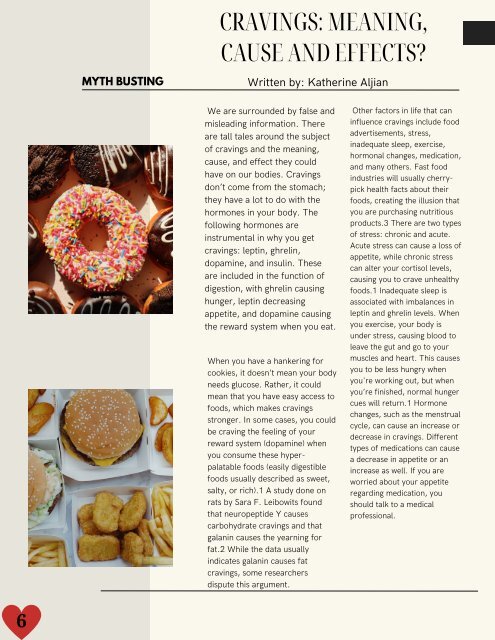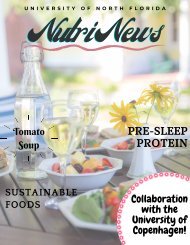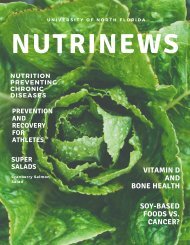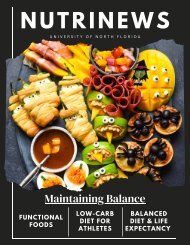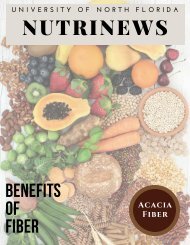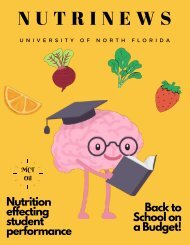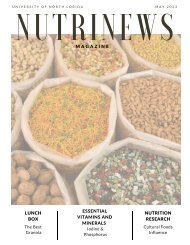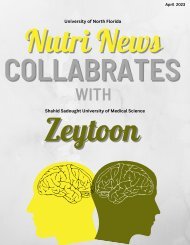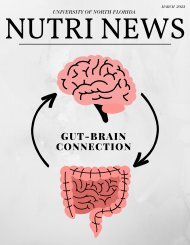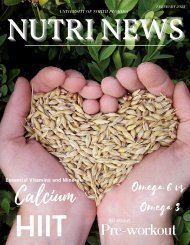February Issue 2024
This month the theme of our issue is Young at Heart. February is here and that means heart health month is too! In this issue of NutriNews we focus on nutrition and heart health. Lifestyle and nutrition play a significant role in our health, especially when it comes to the heart.
This month the theme of our issue is Young at Heart. February is here and that means heart health month is too! In this issue of NutriNews we focus on nutrition and heart health. Lifestyle and nutrition play a significant role in our health, especially when it comes to the heart.
You also want an ePaper? Increase the reach of your titles
YUMPU automatically turns print PDFs into web optimized ePapers that Google loves.
MYTH BUSTING<br />
CRAVINGS: MEANING,<br />
CAUSE AND EFFECTS?<br />
Written by: Katherine Aljian<br />
We are surrounded by false and<br />
misleading information. There<br />
are tall tales around the subject<br />
of cravings and the meaning,<br />
cause, and effect they could<br />
have on our bodies. Cravings<br />
don’t come from the stomach;<br />
they have a lot to do with the<br />
hormones in your body. The<br />
following hormones are<br />
instrumental in why you get<br />
cravings: leptin, ghrelin,<br />
dopamine, and insulin. These<br />
are included in the function of<br />
digestion, with ghrelin causing<br />
hunger, leptin decreasing<br />
appetite, and dopamine causing<br />
the reward system when you eat.<br />
When you have a hankering for<br />
cookies, it doesn’t mean your body<br />
needs glucose. Rather, it could<br />
mean that you have easy access to<br />
foods, which makes cravings<br />
stronger. In some cases, you could<br />
be craving the feeling of your<br />
reward system (dopamine) when<br />
you consume these hyperpalatable<br />
foods (easily digestible<br />
foods usually described as sweet,<br />
salty, or rich).1 A study done on<br />
rats by Sara F. Leibowits found<br />
that neuropeptide Y causes<br />
carbohydrate cravings and that<br />
galanin causes the yearning for<br />
fat.2 While the data usually<br />
indicates galanin causes fat<br />
cravings, some researchers<br />
dispute this argument.<br />
Other factors in life that can<br />
influence cravings include food<br />
advertisements, stress,<br />
inadequate sleep, exercise,<br />
hormonal changes, medication,<br />
and many others. Fast food<br />
industries will usually cherrypick<br />
health facts about their<br />
foods, creating the illusion that<br />
you are purchasing nutritious<br />
products.3 There are two types<br />
of stress: chronic and acute.<br />
Acute stress can cause a loss of<br />
appetite, while chronic stress<br />
can alter your cortisol levels,<br />
causing you to crave unhealthy<br />
foods.1 Inadequate sleep is<br />
associated with imbalances in<br />
leptin and ghrelin levels. When<br />
you exercise, your body is<br />
under stress, causing blood to<br />
leave the gut and go to your<br />
muscles and heart. This causes<br />
you to be less hungry when<br />
you're working out, but when<br />
you’re finished, normal hunger<br />
cues will return.1 Hormone<br />
changes, such as the menstrual<br />
cycle, can cause an increase or<br />
decrease in cravings. Different<br />
types of medications can cause<br />
a decrease in appetite or an<br />
increase as well. If you are<br />
worried about your appetite<br />
regarding medication, you<br />
should talk to a medical<br />
professional.<br />
6


